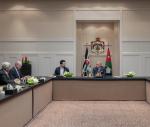You are here
China and global governance
Apr 08,2015 - Last updated at Apr 08,2015
It is safe to say that the most consequential geostrategic development of the last two decades has been China’s rise.
Yet the West has failed to accord China — not to mention the other major emerging economies — the degree of influence in today’s global governance structures that it merits.
This may be about to change.
As it stands, China relies on bilateral arrangements to deepen its involvement in countries across Asia, Africa and Latin America.
Backed by $3.8 trillion in currency reserves, China has provided infrastructure investment in exchange for commodities, thereby becoming the world’s largest provider of financing for developing countries, with the China Development Bank already offering more loans than the World Bank.
But, given that these bilateral arrangements are executed by state-owned corporations, they often do not adhere to international best practices.
The West has therefore urged China to move toward multilateral processes that meet international standards, while doing more to provide global public goods. US President Barack Obama has gone so far as to call China a “free rider” for its failure to fulfil the responsibilities that many would expect of a global power.
But, if Chinese President Xi Jinping’s recent foreign-policy initiatives are any indication, change may be imminent.
Last July, China led the establishment of the New Development Bank by the five BRICS countries (Brazil, Russia, India, China and South Africa) and contributed significantly to its $100 billion endowment.
Likewise, at the latest Asia-Pacific Economic Cooperation meeting in Beijing, China spearheaded the creation of the Asian Infrastructure Investment Bank (AIIB).
And it has established a $40 billion Silk Road Fund, to support its ambitions to recreate the ancient overland and maritime routes connecting Asia to Europe.
In implementing its so-called “one belt, one road” strategy, China will pursue investments affecting some 60 countries — including in Central Asia, where its portfolio already contains projects worth more than $50 billion.
The maritime route will include the Indian Ocean, the South China Sea and the Mediterranean.
Together, they will form not just a road, but a network to facilitate the transfer of goods and ideas across Eurasia.
Europe’s role in this initiative is already emerging with the Greek Port of Piraeus, operated partly by the Chinese state-owned naval company COSCO, set to be a stop on the maritime route.
The Piraeus Port will be connected to the rest of Europe by Chinese-financed infrastructure in the Balkans and Hungary, consolidating China’s position as the European Union’s main commercial partner.
The New Silk Road initiative reaffirms China’s desire to establish itself as a Eurasian power.
Not only will it connect the dynamic economic hubs of East Asia and Western Europe, it will also open access to Central Asian countries, where Russia’s influence is in decline. It could also help to ease territorial tensions between China and its immediate neighbours.
So far, China’s efforts to increase its influence seem to be working — and not just in the developing world.
The United Kingdom recently announced its intention to serve as a founding member of the AIIB, triggering a flood of applications from the likes of Australia, Brazil, France, Germany, Korea, Russia, Turkey and Spain.
In the US, however, such developments are perceived as geopolitical setbacks.
This interpretation is fundamentally flawed.
After all, China’s decision to bypass the main international financial institutions, which were created in the aftermath of World War II, has been driven by the refusal of the developed countries that lead them to give it a role commensurate with its economic might.
At the Asian Development Bank, for example, Japan and the US each claim around 13 per cent of the votes, compared to less than 6 per cent for China, and the president is always Japanese.
A similar situation prevails at the World Bank, where an American is always in charge, and the International Monetary Fund, where the managing director is always a European.
Though the G-20 countries agreed in 2010 to increase China’s IMF quota from 3.65 per cent to 6.19 per cent — a small step in the right direction — the US Congress has refused to ratify the agreement, preventing the reforms from being implemented.
The fact is that China’s new initiatives are not revisionist, but reactive.
If new powers are not given access to the existing global governance structures, they will create structures of their own.
This means that the advanced countries have the power to prevent the international order’s fragmentation into ideological and economic blocs — but only if they can overcome their strategic mistrust of China.
In this sense, the participation of more European countries in the AIIB is a positive development, as it helps to ensure that the new bank complements, rather than rivals, existing institutions. (In fact, Europe’s impact would be even greater if the EU, rather than individual members, was represented at the AIIB, as it is at the G-20 and the World Trade Organisation.)
The West must still do more not only to welcome China to the table of global governance, but also to accept and cooperate with the institutions that the Chinese are now creating.
Only with an open attitude can Western leaders ensure that Chinese-led institutions adopt best practices of multilateralism and accountability, and that they adhere to international labour and environmental standards.
Now is the ideal time to initiate this process. If the EU, the US and China take this year to align their intentions, based on their shared interests, they will be prepared to make the most of the G-20 summit in China in 2016.
China’s move into multilateral processes is good news for the world. Europe — and especially the US — must overcome their strategic mistrust of China.
They must not squander the opportunity to participate in and shape these processes, so that the benefits are shared as widely as possible.
The writer was EU high representative for foreign and security policy, secretary-general of NATO, and foreign minister of Spain. He is currently president of the ESADE Centre for Global Economy and Geopolitics and distinguished fellow at the Brookings Institution. ©Project Syndicate, 2015. www.project-syndicate.org











